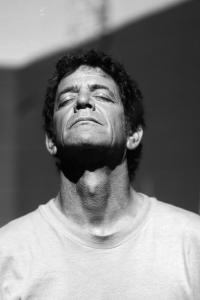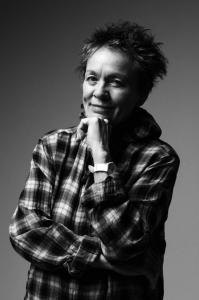
New Lou Reed Book “The Art of the Straight Line” Reveals a New Dimension of the Artist
Book launch event March 14 , 7pm at The Strand, 828 Broadway, New York City
Relatively few, however, are aware of Reed’s other great passion: the martial art of Tai Chi, which he studied for almost thirty years, including the last two decades of his life under Master Ren Guangyi, a champion of Chen Tai Chi. It was a passion Reed carried into his final days and even the final moments of his life. Now the depth of that passion is fully revealed in this beautifully designed book edited by Reed’s wife, the artist Laurie Anderson, with Stephan Berwick, Bob Currie, and Scott Richman.
THE ART OF THE STRAIGHT LINE: My Tai Chi (HarperOne; March 14, 2023; Paperback Original), captures the energy of Lou Reed’s world of Tai Chi, music, and meditation. It is a comprehensive collection of Reed’s writing on Tai Chi and conversations with friends, teachers, and fellow practitioners. “Lou loved to talk about Tai Chi, and he was an enthusiastic teacher,” writes Anderson, who was Reed’s partner for twenty-one years. “He was excited about writing this book, and started out with lots of ideas and plans. But too many things intervened, and the book he began in 2009 was left as scattered notes when he died in 2013.”
Working with Richman, who collaborated and traveled with Reed; Currie, who spent time with him as a friend; and Berwick—a Chinese-style martial art expert and writer who was also a friend and collaborator, Anderson and her co-editors combined her late husband’s own words, his scattered notes, and numerous photographs with the words, voices and varied perspectives of his fellow training partners, teachers, family members and friends.
It incorporates more than 80 interviews with the likes of Julian Schnabel, A.M. Homes, Hal Wilner, Mingyur Rinpoche, Eddie Stern, Tony Visconti, Iggy Pop, Wim Wenders, Lars Ulrich, Michael Imperioli, Darren Aronofsky, Robert Wilson, Sylvia Reed, Jonathan Richman, Reed’s celebrated teacher Master Ren Guangyi, as well as his doctors and martial arts teachers among many others.
The result is an extraordinary glimpse into Reed’s physical, mental and spiritual journey — a rich portrait of a complex, passionate and ever-evolving person constantly challenging himself in music, poetry, and ultimately, martial arts. As the book makes clear, Tai Chi, for Reed became something more than a passionate hobby. It became what he did to survive.
A small sampling of the memorable anecdotes and memories of Reed detailed in THE ART OF THE STRAIGHT LINE: MY TAI CHI include:
• How Reed’s martial arts studies began. Unlike his song-writing—where he could play something on the guitar and almost instantly come up with strong lyrics—practicing martial arts was not something that came easy for Reed. Particularly in the beginning it took all his focus and many months to make the movements of even part of one routine come together.
• The role martial arts played in helping Reed find his way out of an intense cycle of self-destruction marked by years of heavy drug and alcohol abuse—a time when people in the business weren’t sure he’d make it through a show or if he would show up for the next tour. The renewed strength and health that came with his immersion in martial arts helped transform Reed into an artist lauded for his productivity, reliability, and commitment.
• On more than one occasion Reed would say Tai Chi was more important for him than his music.
• Reed’s reflections on Tai Chi as a kind of physical unity of the universe itself, an ancient methodology that could link us to the basic energy wave of existence. “I don’t want to seem mystical,” Lou noted, “but something does happen to you when you practice this ancient art.”
• A look at Reed’s engagement in various types of meditation, the connection between meditation and Tai Chi, his main mediation teacher Mingyur Rimpoche who was also important to Lou’s work and life, and a look at how his passion for Tai Chi became more spiritual over time. As his sister notes, “He became a better version of himself and became an elder statesman. As he developed, even more so with Ren, he understood the discipline in a profound way, and it brought him some peace of mind.”
• Numerous stories touching on the creation of many of Reed’s albums—Berlin, Magic and Loss, The Raven, Lulu (in collaboration with Metallica) and several others. The book also explores the connections some of his albums had to Tai Chi, including 2008’s Hudson River Wind Meditations, which he wrote specifically for meditation practice and became a fixture in Master Ren’s. The book also takes readers behind the scenes of Final Weapon, a poetic martial arts action drama short film created by Berwick that is driven by Lou’s music and features Master Ren, with an appearance by Lou.
• A touching description of Reed’s final moments. Anderson describes him as being completely conscious as he lay dying, and doing a movement from Master Ren’s 21 Form, Tai Chi sequence—as he passed from this world to the next.
This truly unique book, featuring Reed’s unpublished writings on the technique, practice and purpose of martial arts, as well as essays, observations and riffs on meditation and life is a gift for rock and roll fans and seekers of wisdom, insight and inspiration alike.
Melinda Mullin
HarperCollins
melinda.mullin@harpercollins.com
Visit us on social media:
Facebook
Twitter
Instagram
YouTube
Other
The Art of the Straight Line by Lou Reed
EIN Presswire does not exercise editorial control over third-party content provided, uploaded, published, or distributed by users of EIN Presswire. We are a distributor, not a publisher, of 3rd party content. Such content may contain the views, opinions, statements, offers, and other material of the respective users, suppliers, participants, or authors.




